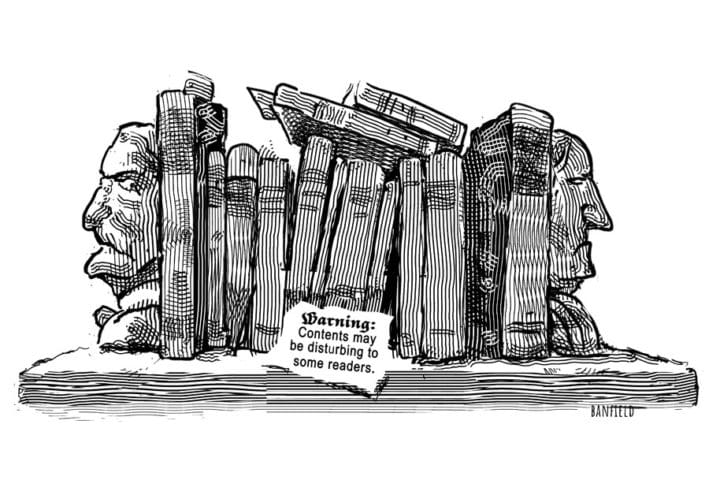Book Reviewed
The defining conflict of our era is whether the United States will remain a democratic republic or morph into a high-tech administrative oligarchy. The late Angelo M. Codevilla called this national struggle our “cold civil war.”
Leaders in the commanding heights of our political and cultural institutions openly revile the fundamental principles of the Declaration of Independence and the U.S. Constitution. They repudiate the core concepts of republican citizenship, national borders, and government by consent of the governed. If given their way, the ruling classes will abolish the sovereignty of the American people.
Claremont Institute Senior Fellow Edward J. Erler has fought tirelessly to preserve the American way of life against these corrosive forces. In the opening pages of The United States in Crisis: Citizenship, Immigration, and the Nation State, Erler explains how elites’ feverish efforts to destroy a duly elected president, Donald Trump, “revealed the extent to which American democracy had, indeed, transmogrified into an oligarchy.” He analyzes this “transmogrification” in terms of three interrelated dynamics: citizenship, immigration, and national sovereignty.
* * *
Erler, a professor of political science emeritus at California State University, San Bernardino, is America’s foremost expert on the ongoing controversy over birthright citizenship for the children of illegal immigrants. He rightly argues that the 14th Amendment’s citizenship clause must be understood in light of the founders’ belief in natural rights, the social compact, and the consent of the governed.
Prior to the Declaration of Independence, the colonists were, under English common law, subjects of King George III. They owed their monarch perpetual allegiance. The great theorists of English common law, Edward Coke and William Blackstone, never spoke of this relationship in terms of “citizens” or “citizenship”—they mentioned only “subjects” and “subjectship.”
But, writes Erler, the Declaration created a new nation: its authors renounced all allegiance to the British crown and so disavowed the common law idea of “subjectship.” Unlike British subjectship, this new American citizenship was not perpetual and involuntary, but based upon consent. The American Revolution meant that the “historical rights [of Englishmen] were transformed into natural rights grounded in the law of nature.”
American citizenship was formally defined for the first time by the Reconstruction Congress in the Civil Rights Act (1866), the Expatriation Act (1868), and the citizenship clause of the 14th Amendment (1868), which overturned the Supreme Court’s 1857 decision in Dred Scott v. Sandford. These new laws made it clear that former slaves and people of African descent were citizens of the United States. Senator Jacob Howard (a major sponsor of the Reconstruction laws) declared unequivocally that American citizenship was based on “natural law and national law,” not the subjectship of the common law.
Another principal sponsor, Congressman Frederick Woodbridge, reaffirmed the founders’ natural rights framework by explicitly denouncing the common law concept of perpetual allegiance. He stated that this “doctrine” is “based upon the feudal system under which there were no free citizens” and is “at war with every principle of justice and of sound public law.”
* * *
These attitudes informed the laws that formally defined citizenship. The Civil Rights Act of 1866 attributed American citizenship to “all persons born in the United States and not subject to any foreign power,” as well as to naturalized immigrants. Thus, for example, American Indians were not citizens because they were subject to their tribal authorities, effectively a foreign power. The 14th Amendment constitutionalized this definition of citizenship, protecting it against repeal by a future Congress.
Meanwhile the Expatriation Act, echoing Thomas Jefferson’s views in Notes on the State of Virginia, declared that expatriation is a “natural right”—i.e., that citizenship, unlike subjectship, depends on consent and can be voluntarily renounced. But consent is a two-way street: both sides must agree to the social compact. And so, just as individuals may give up their citizenship, the American people have the right to reject, as well as accept, potential immigrants.
As revealed by congressional debates, the framers of the 14th Amendment stipulated that citizens must be “subject to the jurisdiction” of the U.S. in order to limit birthright citizenship by excluding foreigners and aliens who owe allegiance to a foreign power. As the Civil Rights Act clearly stated, the children of aliens whose parents were “subject to any foreign power” could not become American citizens. Because subjectship is not adopted voluntarily but conferred, those children would be subject by default to the same foreign power as their parents.
Despite this clear evidence that not all children born on American soil are citizens by default, the Supreme Court in United States v. Wong Kim Ark (1898) ruled in favor of automatic birthright citizenship. This was the same Supreme Court that had issued the infamous “separate but equal” ruling two years earlier in Plessy v. Ferguson. The majority (5-4) decision in Wong Kim Ark declared that the citizenship clause of the 14th Amendment “must be interpreted in light of the common law.” Thus, the Court in Wong Kim Ark embraced the “feudal relic” of English common law “citizenship” (i.e., subjectship) that both America’s founders and the framers of the 14th Amendment had explicitly rejected as being opposed to the founding principles of the Declaration and Constitution.
* * *
For more than a decade, Erler has argued that Wong Kim Ark was wrongly decided. The controversy heated up when President Trump openly considered an executive order that would have ended birthright citizenship. Erler supported the idea, on the grounds that the framers of the 14th Amendment meant to exclude from American citizenship all foreigners (not simply the children of foreign diplomats). At this point Erler, and all who agreed with his views, suffered hysterical attacks from liberals and even conservatives who supported automatic birthright citizenship for the children of illegal aliens.
In a footnote (all of which are worth reading in this book), Erler tells us “the attack was vicious and coordinated and succeeded in intimidating one national conservative publication into compliance, admittedly not a difficult task.” (The publication, which the author does not mention but this reviewer will, was National Review, whose editors changed the text of an older Erler essay without consulting him.)
These ferocious and urgent debates over citizenship have direct consequences at the nation’s borders. In the final paragraph of the book, Erler maintains that constitutional governments which “insist on erasing effective borders” will “dissolve into dysfunction.” At the time of this writing, the United States is in the middle of the worst border crisis in our history, with thousands of illegal aliens from all over the world and record amounts of the deadly drug fentanyl entering our country every day. Effective control of the southern border is not in the hands of the U.S. government, but of Mexican cartels whose reach extends far into the American heartland.
* * *
This anarchic situation is the result of deliberate policy by the Biden-Harris Administration, which appears to believe that a maximal influx of unvetted immigrants can advance the long-term progressive goal of “fundamental transformation.” According to Erler, this belief is correct: he traces the “radical transformation of American politics” to the mass low-skilled immigration triggered by the Immigration Act of 1965. The reforms of the Great Society era, the amnesty of 1986, and unceasing migration have furnished vast numbers of dependent “clients” for the administrative state (as opposed to self-reliant citizens of the republic).
The Republican establishment is also complicit in promoting (and, even today, still advocating) so-called “comprehensive immigration reform.” This is more accurately understood as mass low-skilled immigration which, it should always be remembered, will take place within an anti-assimilationist regime that erodes national cohesion by promoting bilingual education, affirmative action, multiculturalism, globalism, transnational allegiance, and “diversity.” When some of us in White House meetings during the George W. Bush years raised the imperative of assimilating immigrants and teaching patriotism, our arguments were ignored. It is also worth noting that dual citizenship—and thus dual allegiance—was normalized by the State Department under the leadership of that quintessential establishment Republican, James Baker III. Dual citizenship makes a patent nonsense of the ostensibly solemn oath, which all naturalized citizens must take, to “absolutely and entirely renounce” all previous allegiances.
These developments serve to bolster what Erler refers to as the “universal homogenous state.” CRB readers will recognize this concept as French philosopher Alexandre Kojève’s prediction of history’s inevitable endpoint. Leo Strauss famously responded to Kojève that under the “universal and homogenous state” there would be no escape from the “Universal and Final Tyrant.” Twenty-first-century adherents of transnational progressive ideology claim to favor not world government but “global governance.” In their ideal future, nations would still exist, but would be subordinate to supranational administrative and legal structures. The European Union serves as a model for the advocates of transnational governance. Meanwhile, the partisans of liberal internationalism—in their cadres at the Council on Foreign Relations, the State Department, major NGOs, and elite universities—are busy promoting a type of “universal homogenous state”-lite. They advocate the oxymoron of “shared” or “pooled” sovereignty which would, by definition, diminish the sovereignty of the American people. As James Madison emphasized in The Federalist, that sovereignty is indispensable for our democratic republic.
* * *
The irony is that the practitioners of “liberal internationalism” are neither “liberal” (they favor ethnic and sexual group preferences over individual citizenship), nor “inter-national” (“inter” means relations between nations). Rather, they are “supra-national,” advocating the establishment of regulations and governing bodies which override the authority of sovereign nation-states.
Our “cold civil war” is a war over every aspect of the regime. It consists of both a cultural front—involving disputes over history, mores, and habits—and a constitutional front—involving foundational legal and political conflicts which Christopher Caldwell and Charles Kesler have identified as evidence of two “competing” or “rival” constitutions. “Diversity,” “equity,” and “wokeness” are all names for a rival regime, incompatible with, and antithetical to, American constitutional democracy. As Erler declares, “any nation that believes that diversity is its strength has already made the decision to dissolve itself.”
The crucial issue facing us today on all fronts is: could a patriotic revival unmake the enormous inroads of the woke revolution and restore true American citizenship, as articulated by the founders and defended by Erler? Erler himself, at times, despairs of the possibility: “[T]here will be racial and ethnic reparations and almost certainly, mandatory instruction in Critical Race Theory.” But this conclusion is too bleak, for the issue remains unresolved. Ultimately, the success or failure of the woke revolution depends upon the dedication of the counterrevolutionaries: do we have the courage to fight back? If so, then the total homogeneous state may yet be defeated by the last best hope of earth—the American republic.




